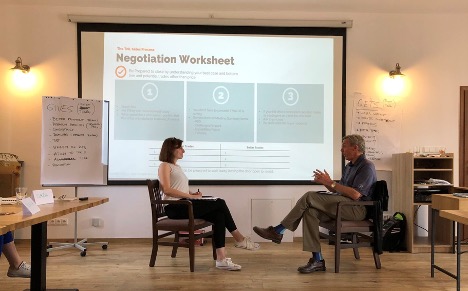In the world of business-to-business sales, referrals have become an invaluable tool for generating leads and driving growth. With the increasing emphasis on relationship-building and trust, businesses are recognizing the power of tapping into their existing networks to unlock new opportunities. A well-executed referral program not only strengthens connections with satisfied clients but also opens doors to a wider pool of potential customers. By leveraging the trust and credibility built through previous successful partnerships, businesses can secure warm introductions that carry a higher likelihood of converting into profitable sales. In an era where trust and authenticity are paramount, embracing the potential of B2B sales referrals is a strategic move that can supercharge your sales pipeline and propel your business towards sustained success.
Archive for month: June, 2023
If only your sales representatives could persuade their customers and prospects as effectively as they convince you, their manager, about the necessity of obtaining SPQs (Special Price Quotes) or discounts at the end of the month or quarter, you wouldn’t find yourself trapped in this predicament driven by buyers. Unfortunately, we often find ourselves in the final days of the month or quarter, where buyers sense the opportunity to negotiate lower prices and push sellers to meet their revenue targets. This scenario has become predictable and tiresome, but with the right approach, it can be handled easily.
Some sellers are well-versed in countering this madness by establishing and emphasizing the value of their offerings early and consistently throughout the sales process. However, if you have neglected this crucial step and are now trying to close deals, it may be too late. If you have already done so, congratulations! You have equipped yourself with insurance for this high-pressure closing dialogue.
According to Forrester Research, a mere 26% of CEOs believe that their salespeople possess the ability to help customers truly comprehend the value their organization provides. So, what about the remaining 74%? They are currently lining up at your office, seeking those SPQs. The decision to grant them lies in how effectively they sell the idea to you.
To prevent this situation from recurring in future quarters, it’s worth examining the insights shared in the blog post “Help Your Sales People Hold Pricing.” Afterwards, don’t hesitate to reach out to us for a conversation. We are prepared and ready. Are your sellers?
In the dynamic realm of business-to-business (B2B) sales, effective sales coaching is paramount to achieving outstanding results. Sales managers play a critical role in guiding and developing their teams, helping them excel in the art of persuasion and relationship-building. In this blog post, we will explore the significance of sales coaching in the B2B space and outline key strategies to help sales managers elevate their coaching game.
- Understanding the Role of Sales Coaching: Sales coaching goes beyond mere instruction or oversight. It is a proactive process that empowers sales managers to foster growth, optimize performance, and drive revenue generation within their teams. By identifying individual strengths, areas for improvement, and aligning them with organizational objectives, sales coaching plays a pivotal role in cultivating a high-performing sales force.
- Developing a Coaching Mindset: Successful sales coaching begins with cultivating a coaching mindset within sales managers. It involves adopting a collaborative approach rather than a directive one. Encouraging open communication, active listening, and empathy can establish a trusting relationship between managers and their sales representatives, creating an environment conducive to growth and learning.
- Setting Clear Goals and Expectations: Clarity is key when it comes to sales coaching. Sales managers must establish clear goals and expectations for their team members, ensuring everyone is aligned and working towards a shared vision. Setting measurable objectives, such as specific revenue targets, customer acquisition rates, or conversion rates, provides a framework for progress evaluation and motivates individuals to strive for excellence.
- Personalized Coaching Plans: Every sales representative possesses unique strengths and areas for improvement. Effective sales coaching requires managers to create personalized coaching plans tailored to each team member’s needs. Conducting regular assessments, such as skill gap analysis or performance evaluations, helps identify specific areas that require attention. By addressing these gaps through targeted training and mentorship, managers can unlock the potential of their sales team members.
- Ongoing Skill Development: Sales coaching is an ongoing process that should foster continuous skill development. Encourage self-reflection and self-assessment among sales representatives, allowing them to identify their own strengths and areas for improvement. Providing access to resources, training programs, and industry insights can further enhance their knowledge and expertise, equipping them with the tools to adapt to evolving market dynamics.
- Effective Communication and Feedback: Communication lies at the core of successful sales coaching. Regular feedback sessions, both individual and collective, allow managers to provide constructive criticism, highlight achievements, and offer guidance. By fostering a culture of open dialogue, sales managers can create an environment where sales representatives feel supported, empowered, and motivated to achieve their goals.
- Lead by Example: Sales managers must lead by example, demonstrating the qualities and behaviors they expect from their team. By exhibiting strong sales skills, effective communication, and a passion for continuous improvement, managers inspire their team members to follow suit. Leading by example builds credibility and trust, fostering a positive coaching environment that drives excellence.
Conclusion: In the competitive world of B2B sales, sales coaching is the catalyst that propels sales teams to surpass their targets. By embracing a coaching mindset, setting clear goals, and developing personalized coaching plans, sales managers can optimize their team’s performance and foster a culture of continuous improvement. Through effective communication, ongoing skill development, and leading by example, sales managers can unlock the full potential of their sales force and achieve remarkable results in the B2B sales arena.
My latest travels took me on a personal getaway to unplug for a while and hit refresh. We all need to do this from time to time as a way to remain healthy and connected in all aspects of life. Listen in on the perspective shared from the Blue Spirit Retreat Center in Nosara, Costa Rica, a magical place indeed (bluespiritcostarica.com). What are you doing to hit “refresh”?


